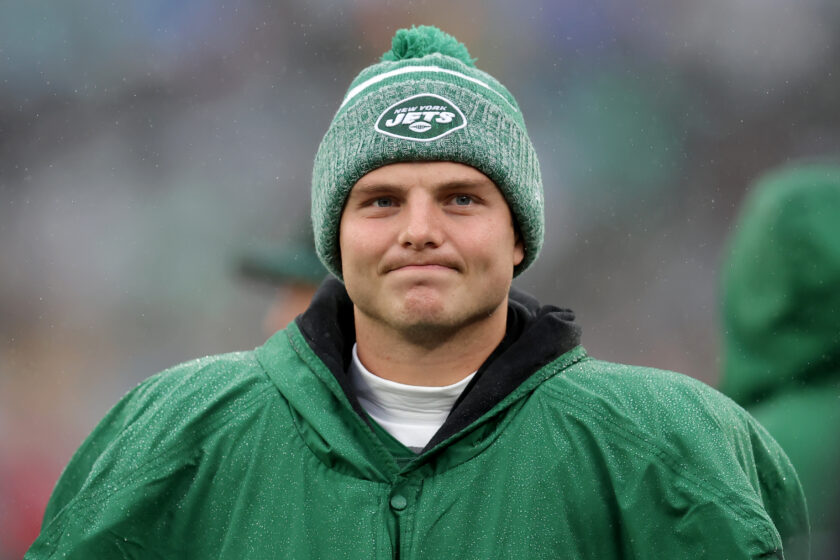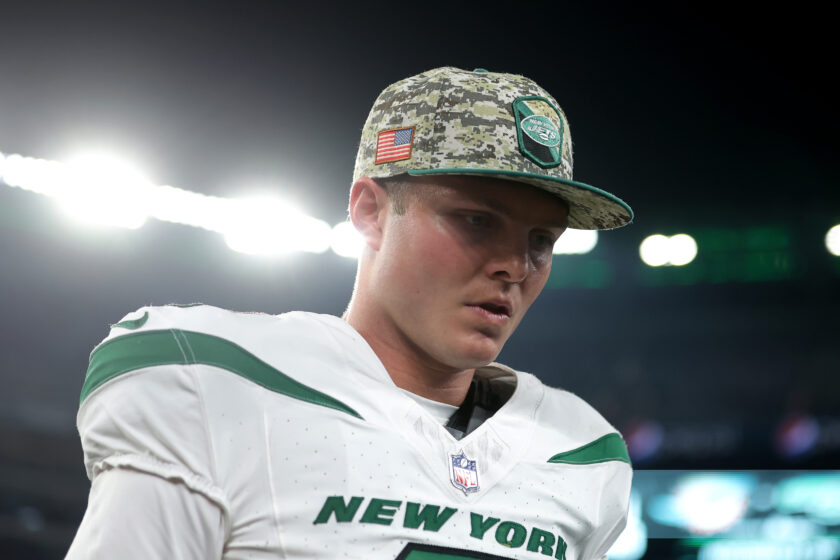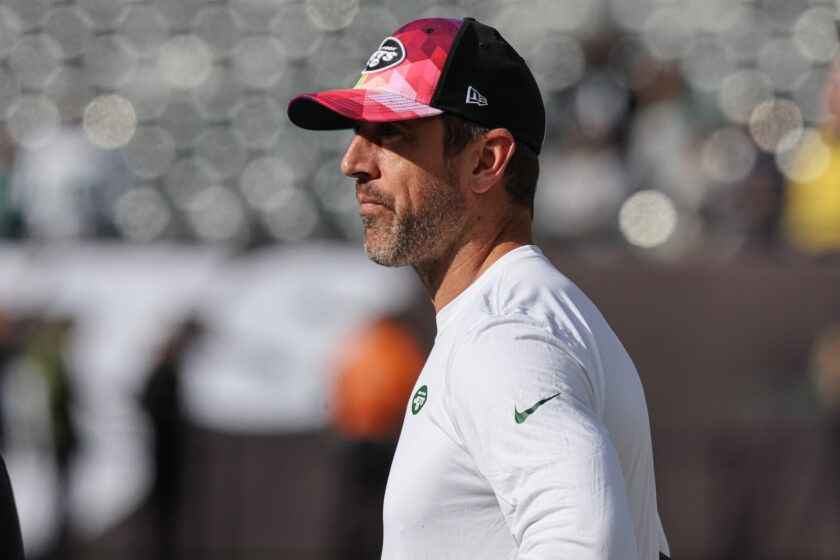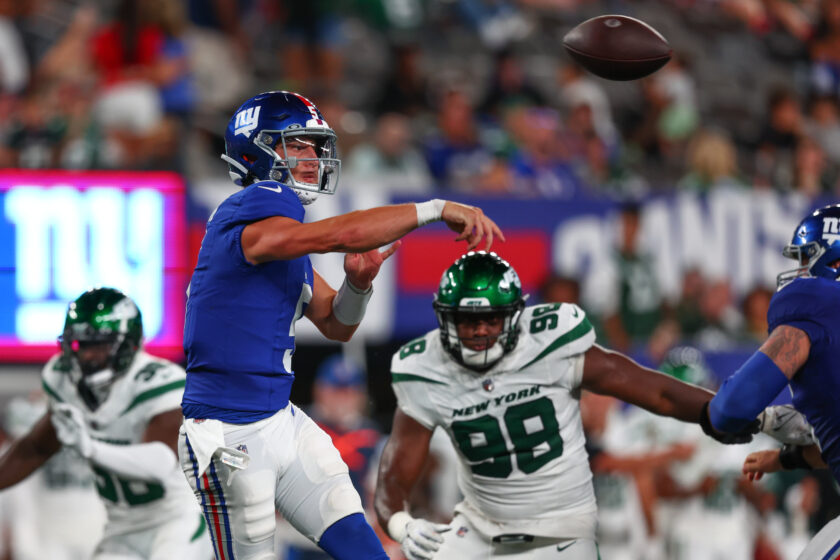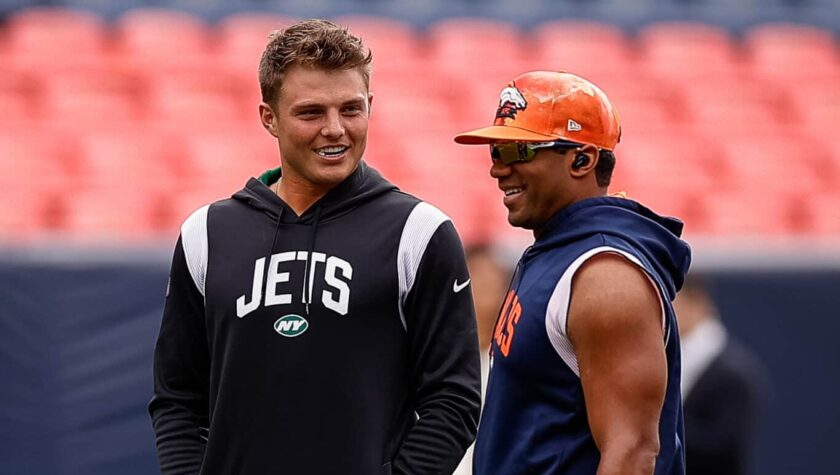New York Jets: Kirk Cousins won’t work based on recent QB-cap hit history
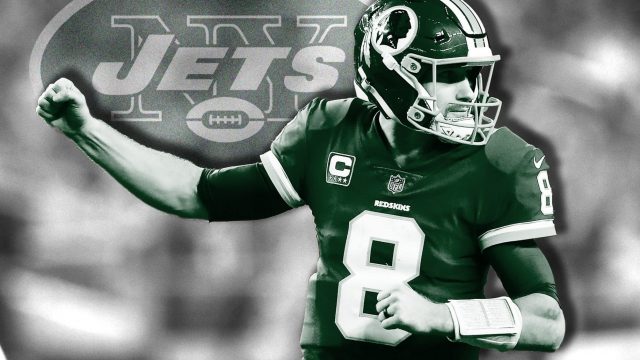
Many individuals fall prey to thinking those anti-Kirk Cousins angles are about the free agent quarterback himself. It’s an incorrect notion. Instead, it has everything to do with the New York Jets and the very unforgiving hard NFL salary cap.
So many have it so incredibly wrong. Actually, you (the person reading this very space of the internet) probably has it wrong as well.
You think the man or woman who bashes the idea of Kirk Cousins to the New York Jets is out of his or her wit. You think, “Man, the Jets haven’t employed a legit quarterback since Joe Namath. How in the world could anybody say no to Cousins? He’d be the squad’s best quarterback in such a long period of time.”
The best since Ken O’Brien, perhaps? Or maybe Chad Pennington? Or … dare I say Kirk Cousins could be the organization’s most talented QB since No. 12?
You’d be right in that assumption … probably. What you’re missing is the big picture and the reason for why so many automatically dry heave at the sight of Cousins in the color green (taking away his Michigan State days, of course).
It’s not about Cousins, per se. It’s about the rigorous collective-bargaining agreement the Jets front office works under. It’s about that damn hard NFL salary cap.
So many of the negative Cousins folks would say yes if he cost $15-$20 million a season. So many of those same exact fans would jump for joy at the idea of Cousins at $30 million a campaign if there was no hard cap. After all, this is New York and the Jets would rank in the top five in a baseball-like non-cap environment.
Obviously, the previous thought is fiction.
Cousins at $30 million a year as the highest-paid quarterback in history brings negative thoughts as it pertains to the big picture. Is Kirk Cousins actually capable of living up to 20 percent of the entire salary cap?
Should Cousins rake in a deal for a cool $30 million a season, he’d eat up 17 percent of the total $177.2 million cap in 2018. We already understand any deal forthcoming to the market’s big whale would be frontloaded. Cousins’ first and perhaps second-year salary or cap hit could range in the $40-million area, making his piece of the total pie at a robust 22.5 percent.
Is this man good enough to win a Super Bowl with a team around him receiving under 80 percent of the total cap?
[sc name=”Jets Center” ]That’s the pressing issue at hand.
History suggests no.
Take a look at the highest-paid quarterbacks in the NFL. Most of the top names are employed by franchises who desperately struggle in terms of championship-caliber play.
First and foremost, it’s important to separate “average” from “cap hit.” The average takes the entire deal and spreads it across the length of the contract, even including non-guaranteed money (since it counts if the player is still employed). The cap hit is totally dependent on how the deal is structured. In Cousins’ case, his cap hits will be rough over the first couple of years as compared to the latter part of the deal.
2016 QB Cap Hits:
- Eli Manning, Giants: $24.2M
- Ben Roethlisberger, Steelers: $23.9M
- Matt Ryan, Falcons: $23.75M
- Joe Flacco, Ravens: $22.55M
- Matthew Stafford, Lions: $22.5M
- Tony Romo, Cowboys: $22.8M
- Kirk Cousins, Redskins: $19.9M
- Cam Newton, Panthers: $19.5M
- Aaron Rodgers, Packers: $19.25M
- Russell Wilson, Seahawks: $18.5M
Matt Ryan is an example of a quarterback leading a championship-caliber team. Two years ago—if not for the greatest choke-job in Super Bowl history—the Atlanta Falcons are crowned champs. Still, the team, after one fantastic season, is in search of a title.
Eli Manning, Ben Roethlisberger, Joe Flacco—none have won a chip in quite some time.
2017 QB Cap Hits:
- Joe Flacco, Ravens: $24.55M
- Carson Palmer, Cardinals: $24.1M
- Kirk Cousins, Redskins: $23.9M
- Matt Ryan, Falcons: $23.75M
- Aaron Rodgers, Packers: $20.3M
- Ryan Tannehill, Dolphins: $20.3M
- Cam Newton, Panthers: $20.2M
- Eli Manning, Giants: $20.7M
- Andrew Luck, Colts: $19.4M
- Drew Brees, Saints: $19M
How did it work out for the Baltimore Ravens, Arizona Cardinals, Washington Redskins, Miami Dolphins, New York Giants and Indianapolis Colts this past season?
2018 QB Cap Hits:
- Kirk Cousins, N/A: ?
- Jimmy Garoppolo, 49ers: $37.0M
- Drew Brees, Saints: ?
- Matthew Stafford, Lions: $26.5M
- Derek Carr, Raiders: $25.0M
- Joe Flacco, Ravens: $24.75M
- Andrew Luck, Colts: $24.4M
- Russell Wilson, Seahawks: $23.8M
- Ben Roethlisberger, Steelers: $23.2M
- Eli Manning, Giants: $22.2M
- Tom Brady, Patriots: $22.0M
The 2018 list is dependent on how much both Kirk Cousins and Drew Brees receive on the open market.
Now, we take a look at the last seven Super Bowl champs and compute the percentage of the cap the quarterback used up.
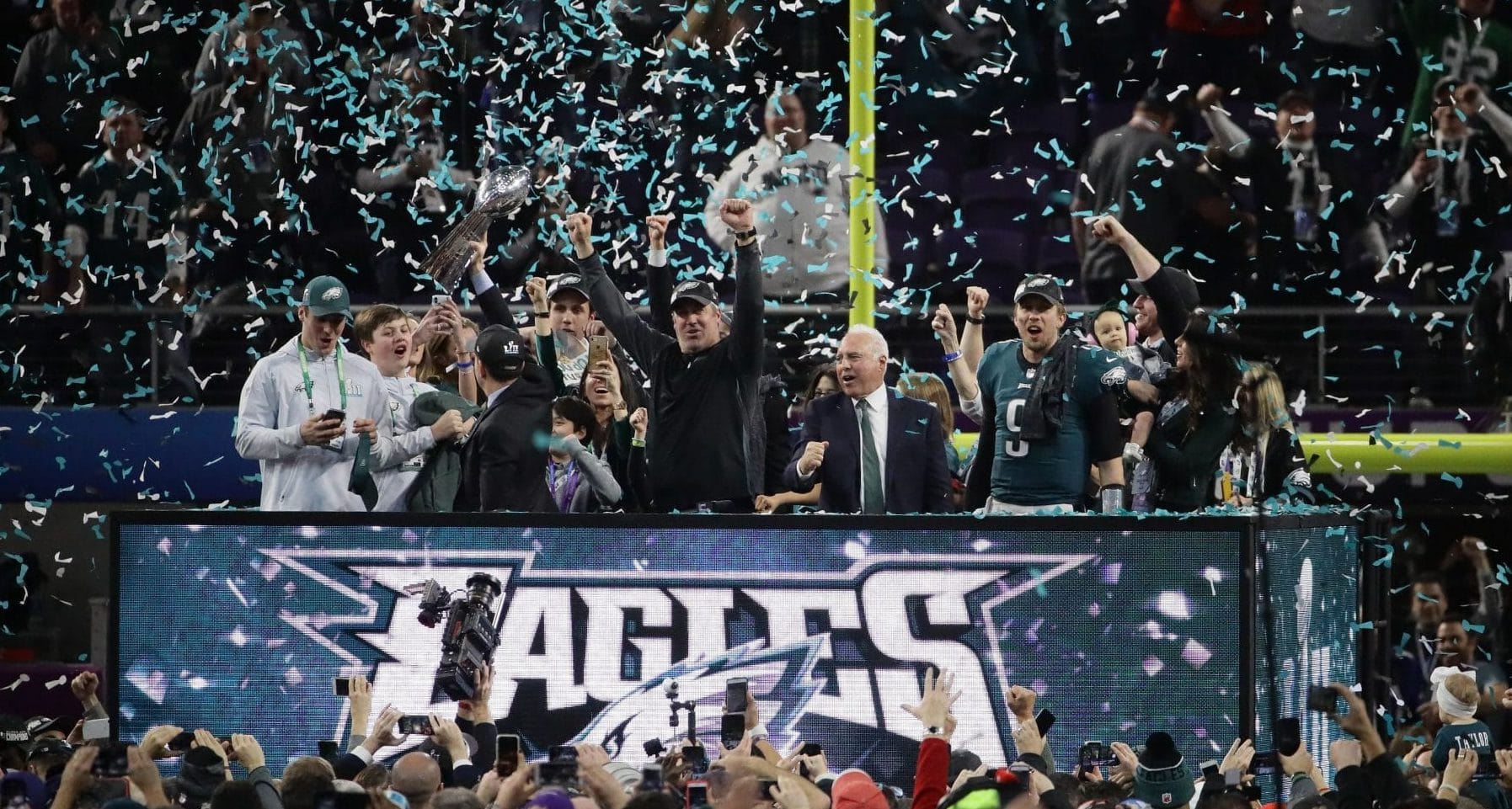
Super Bowl Champion QB Cap Hit Percentages:
- 2017: Carson Wentz and Nick Foles, $7.7M: 4.6 percent of the $167M cap
- 2016: Tom Brady, $13.7M: 9 percent of the $155.27M cap
- 2015: Peyton Manning, $17.5M: 12 percent of the $144.28M cap
- 2014: Tom Brady, $14.8M: 11 percent of the $133M cap
- 2013: Russell Wilson, $681K: .05 percent of the $123M cap
- 2012: Joe Flacco, $8M: 6.6 percent of the $120.6M cap
- 2011: Eli Manning, $14.1M: 11.75 percent of the $120M cap
Peyton Manning’s 2015 championship season of owning 12 percent of the cap comes in as the top number. It’s a pretty far cry from a Kirk Cousins raking in nearly or more than 20 percent of the cap.
And take a peek at both Flacco and Wilson. Each’s championship season came when salaries were manageable, allowing for a much better team around them. Since those magical runs, each quarterback has received large paydays and both franchises haven’t sniffed the Super Bowl (Seattle’s second Super Bowl appearance came the year before Wilson’s big offseason).
As soon as Wilson and Flacco received those huge paydays, they’ve joined the purgatory class of “solid” squad without any real shot of a title, just like Matthew Stafford’s deal forces the Detroit Lions into.
Additionally, when Andrew Luck was healthy and playing on his cheap rookie deal, his Indianapolis Colts were a force to be reckoned with. Since that big contract (and, of course, coupled with the injury), all good vibes have evaporated in the city that hosts the combine.
Here are the upcoming percentages as it relates to the recent outrageous cap numbers under the $177.2 million hard cap.
- Kirk Cousins, N/A: ?
- Jimmy Garoppolo, 49ers, $37M: 20.9 percent
- Drew Brees, Saints: ?
- Matthew Stafford, Lions, $26.5M: 14.95 percent
- Derek Carr, Raiders, $25.0M: 14.1 percent
- Joe Flacco, Ravens, $24.75M: 13.96 percent
- Andrew Luck, Colts, $24.4M: 13.76 percent
- Russell Wilson, Seahawks, $23.8M: 13.43 percent
- Ben Roethlisberger, Steelers, $23.2M: 13.09 percent
- Eli Manning, Giants, $22.2M: 12.52 percent
- Tom Brady, Patriots, $22.0M: 12.41 percent
Something’s wrong here.
Sure, the cap continuously grows. Just as the stock market fluctuates, we know this. It also won’t stop growing. But the percentages currently being dished out to the arms on the open market isn’t matching up to what actually wins in this league. The percentage of QB money is suspiciously rising far beyond the increasing cap.
Jimmy G’s new deal sets the new bar at 20.9 percent of the total cap. Here are the leading numbers for the previous seven seasons.
- 2017 Top QB, Joe Flacco, $24.55: 14.7 percent of the $167M cap
- 2016 Top QB, Eli Manning, $24.2M: 15.58 percent of the $155.72M cap
- 2015 Top QB, Drew Brees, $23.8M: 16.61 percent of the $143.28M cap
- 2014 Top QB, Eli Manning, $20.4M: 15.33 percent of the $133M cap
- 2013 Top QB, Eli Manning, $20.85M: 16.95 percent of the $123M cap
- 2012 Top QB, Peyton Manning, $18M: 14.92 percent of the $120.6M cap
- 2011 Top QB, Mark Sanchez, $17.22M: 14.35 percent of the $120M cap
So, after you stop laughing at the name of Mark Sanchez popping up as the highest-paid QB in 2011, you come to realize that the highest percentage of the cap over the last seven years a QB has claimed is 16.95, Eli Manning in 2013, a season that was not kind to the Giants (7-9).
Eli received that brand-spanking new deal after his second title. Oh yeah, guess the percentage of the cap Eli took home during the 2011 campaign, the Giants last Super Bowl? A cool 11.75 percent. And the Jets weren’t too bad while Sanchez was taking home less money on his rookie deal (two AFC Championship Game appearances).
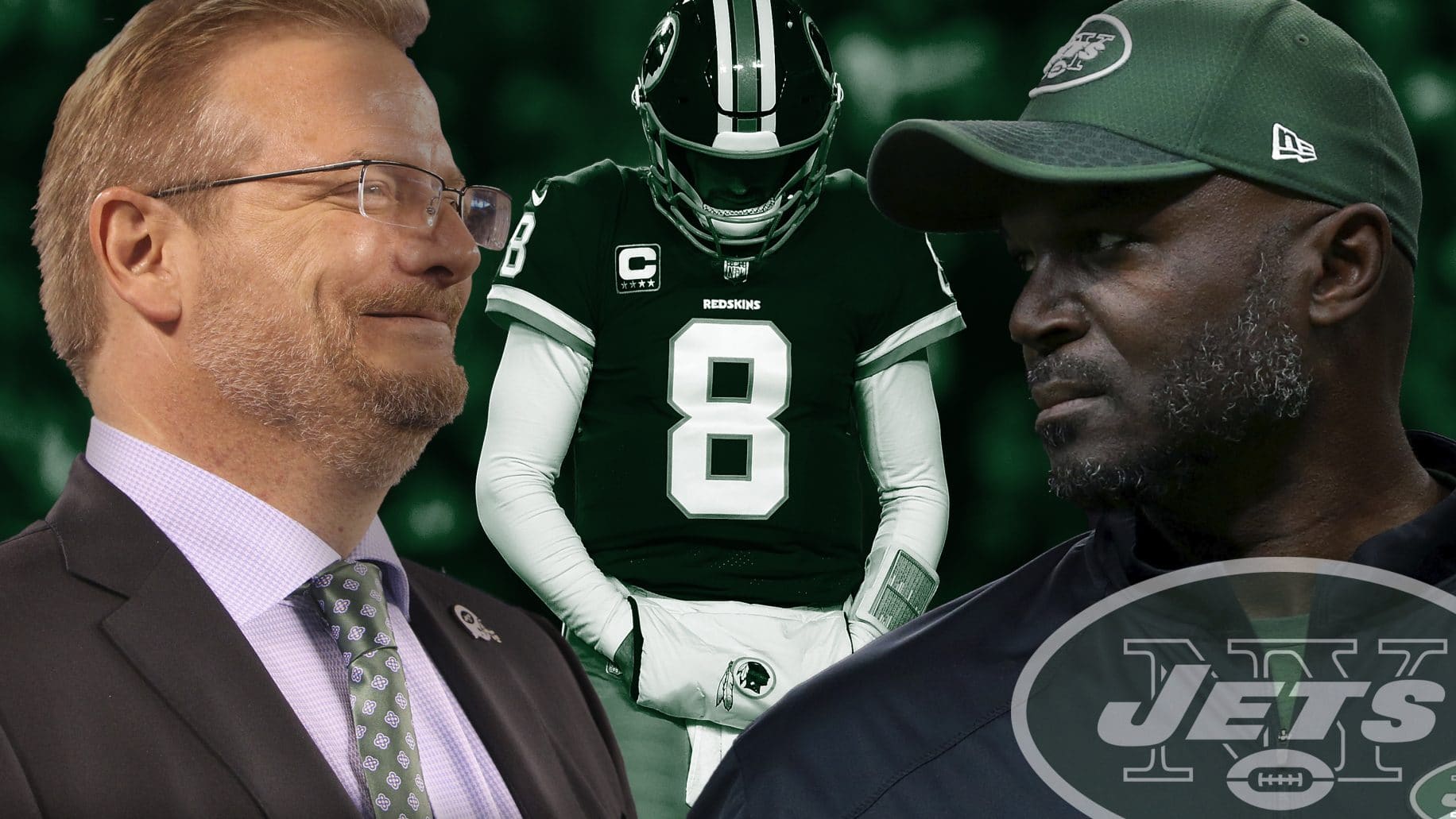
Despite all of the numbers and recent history suggesting overpaying quarterbacks who don’t deserve the money lead to mediocrity, Garoppolo destroys the bank and Cousins is about to surpass him, ready to take home over 20 percent of a team’s pie.
It’s not about Cousins. He’s a fine quarterback. We can argue how great he is all we want. Nobody knows whether he’s outside the top 10 or closer to top five or perhaps middle-of-the-pack. That argument doesn’t matter.
What matters is only a special type of quarterback can earn 20 percent of the total cap and make it work. Only the best of the best, the guy who obviously changes games with every play—Tom Brady, Aaron Rodgers—can earn that much and potentially make it work.
Speaking of Brady, look at the success he’s garnered while understanding money is needed around him. Perhaps the greatest of all-time sacrifices money in order to enjoy a better New England Patriots squad around him. Sure, Gisele’s outrageous dough helps, but his total piece of the Pats pie is lower for a legit reason.
But What About the Jets Having So Much Money to Spend?
It doesn’t matter from a cap perspective that the Jets come to the offseason party with an insane amount of cap space. Every slot of the Top 51 count and every one of the Top 51 are always judged and come together or not based on value.
Simply because Mike Maccagnan has money to spend now doesn’t make the right move to overpay a Kirk Cousins now. If he fails to play like the best QB in the league (which is likely), that devalues the position in-house and offers less money for the other slots. It also creates issues down the road.
Not too long ago the same scenario faced the Jets. During Mike Maccagnan’s rookie GM offseason, he went nuts with his “aggressive rebuild,” taking advantage of the insane cap space John Idzik left on the table. Signing Darrelle Revis felt like a smart thing, even while overpaying.
How’d that work out?
Eventually, bad deals catch up over time. It doesn’t matter how much money is currently free. Value is value across the entire depth chart and the hard cap.
https://soundcloud.com/elite-sports-ny/sabo-radio-hey-new-york-jets-just-say-no-to-kirk-cousins
A yes to Kirk Cousins means you believe he’s special enough to earn 20 percent fo the New York Jets total player salary and overcome playing with a team earning 80 percent.
Kirk Cousins Salary Percentage:
- 2017, Redskins (7-9), $23.94M: 14.33 percent of the $167M cap
- 2016, Redskins (8-7-1), $19.95M: 12.84 percent of the $155.27 cap
- 2015, Redskins (9-7, Playoffs) $778.72K: 0.54 percent of the $143.28 cap
Even in the case of Kirk Cousins, the numbers speak for themselves. While making peanuts on his rookie deal, he led the Redskins to nine wins and an NFC East crown. Once he was tagged and started taking home a bigger piece, they struggled.
Over the last seven seasons, never has the top cap hit quarterback won the title. The numbers actually suggest that overpaying good (not great) quarterbacks is a recipe for mediocrity.
Should the Jets sign Kirk Cousins, it’ll be a playoff move, not a championship move. They may play well next season and even make the playoffs, but it’s not a title-contending move that drafting a rookie and playing him on a nice $5M a year deal would be.
If you want Kirk Cousins, you better believe the guy is special, and I mean top two or three NFL QB special. Anything other than that won’t get it done when the man is eating up over 20 percent of the total team’s payroll.
It’s nothing personal against you, Kirk. In fact, it’s not you. It’s me. I understand the rules we play under. History suggests the New York Jets draft a youngster, pay him peanuts while developing him and building an all-around fantastic depth chart.
It’s not about employing the best quarterback in quite some time. It’s about winning Super Bowls.
[sc name=”Jets Link Next” link=”https://elitesportsny.com/2018/02/20/new-york-jets-clamoring-kirk-cousins-reeks-desperation-over-insight/” text=”The Jets Interest In Kirk Cousins Reeks Of Desperation Over Championship Insight” ]Robby Sabo is a co-founder, CEO and credentialed New York Jets content creator for Jets X-Factor - Jet X, which includes Sabo's Sessions (in-depth film breakdowns) and Sabo with the Jets. Host: Underdog Jets Podcast with Wayne Chrebet and Sabo Radio. Member: Pro Football Writers of America. Coach: Port Jervis (NY) High School. Washed up strong safety and 400M runner. SEO: XL Media. Founder: Elite Sports NY - ESNY (Sold in 2020). SEO: XL Media.
Email: robby.sabo[at]jetsxfactor.com

